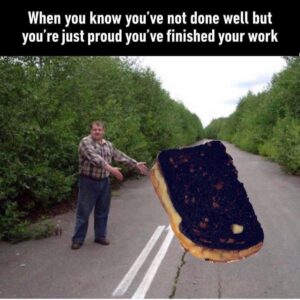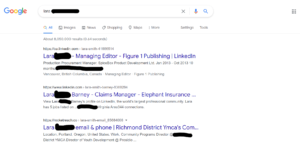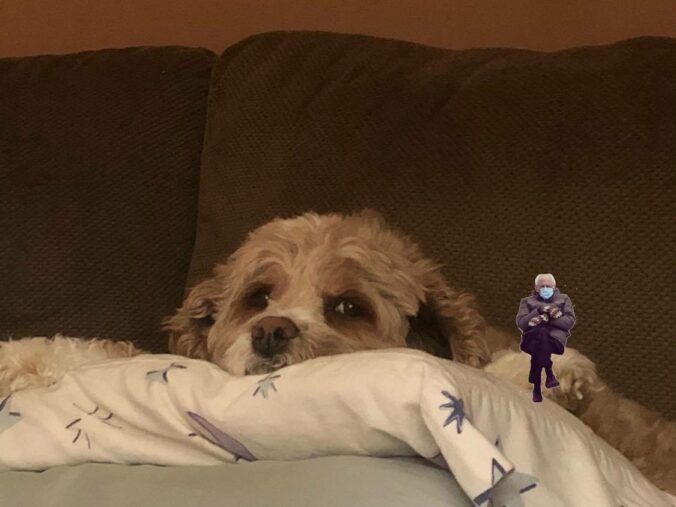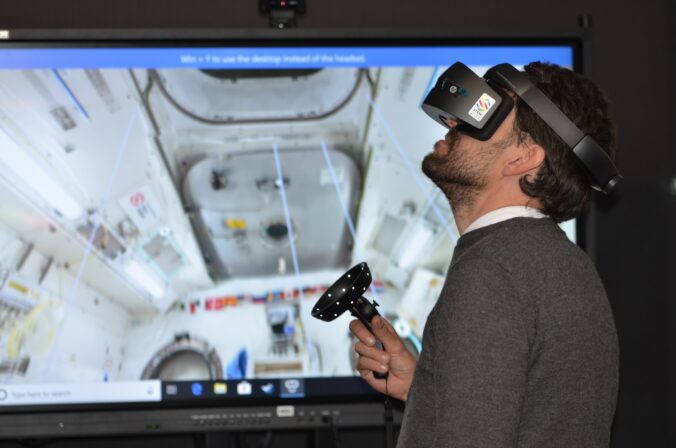Author: larasmith (Page 7 of 7)
In class this week we learned about the Multimedia Learning Hypothesis. I found this interesting since I know about all the different types of learners (Visual, Kinesthetic, and Auditory). When presentations have both words and pictures together, it targets two different learners. This not only helps them individually, but since they work together they will get more examples of how things work. Dual coding was also mentioned in class, which means that two ways are used and coded successfully together. We also learned about different ways to edit photos, in particular, we looked at the viral Bernie Sanders meme. As you can see above, the photo I used to make my meme was a picture of my dog sitting on the couch. Although in class we went over how to use PowerPoint to edit photos; when I was in high school I took a photography class where my friend showed me different apps to use on an iPhone.
The app I use is called Picsart. There is a premium and a free version, but the free version works quite well. This is the app I used to edit my picture from week two (the cat and the croissant) and my Bernie Sanders Meme. I have also included a few examples from when I was in high school below.

For my high school project on legislation.

I burnt my sandwich and added it to the meme.

Poster from my high school theatre group.
Although I did find it interesting that the SmartArt section in PowerPoint can make different charts. Whenever I am making a slideshow, I always try to do it manually and ensure everything is even; however, now that I know this it will be much simpler. After I learned how to make my own, I quickly went to show my friend, since she had a business presentation and needed to make a chart. I look forward to using this function in the future.
Finally, in class, we learned about the difference between Pixels and Vectors. I never knew there was a difference between the two formats and always assumed pictures came in the jpeg format. However, now that I know about Vectors, I see how they are useful. Vectors can expand endlessly, which is good if you need to blow up a picture (which I often do).
Photo by Markus Winkler on Unsplash
This week we talked more about FIPPA and its role in the classroom. In particular, I remember talking about looking at our online footprint. This week, I decided to google my name and see what comes up. As you can see, none of the results came up with information on me. I think this is good since, from what I can tell, it would be harder for a manager, staff, or student to find unwanted information on my life. We also learned about FIPPA and teaching it to our students and I think that is so important because, when I was on my Wednesday visit, a lot of the students were talking about their TikTok accounts but they might not have known about the risk of having a public account.

We also learned about copyright and finding good resources for our classrooms. I learned that the creative commons license allows certain materials to be shared with the class, as long as we follow the rules. There are certain restrictions to ensure that teachers are not plagiarizing full books or research. We also learned about how everything that has been created has copyright. This is great since when I become a teacher, it will protect my resources from being stolen. Another thing is that anything from the internet can be shared with the class, they just cannot be distributed and copied. This is interesting since when I was in high school, I remember teachers taking worksheets and questions off the internet and distributing them to us. I am now wondering if that would have been acceptable under copyright.
I still have a lot to learn around copyright and privacy but I am slowly learning. I am still a little nervous about using resources in my own class, but hopefully throughout the next couple weeks I will be able to learn more about the different sections of copyright to be more confident in using it in the future.
Photo by Saint Sab on Unsplash
Bonjour! Welcome to week two of my French Journey! This week was all about review. I decided to start using Duolingo and made a schedule to start practicing once a day. My goal for each day was categorized “Serious” and I am trying to reach 30 XP each day. Duolingo also allows you to keep streaks, so I am trying not to break mine. For every session you complete, you get 10 XP. The sessions take about ten minutes and are not a big-time commitment.
Since this week was review, I achieved gold status in three topics: Basics, Basics 2, and Greetings. The basic levels were pretty easy. A lot of the information was not new since I had completed some of the levels in Duolingo before and I learned a lot of the phrases in elementary French. Some of the phrases and words included in the Basic package were:
- Greetings:
- Salut | Hi
- Gender
- Femme | Woman
- Homme | Man
- Garcon | Boy
- Fille | Girl
- Articles
- Le/La | The
- Un/Une | A
- Je suis | I am
- And Others!
- Un Chien | A dog
- Un Chat | A cat
- Un Cheval | A horse
- Une Pizza | A pizza
Subject two was Basics two. Once again, these phrases and words were easy to learn. Some of the phrases included were:
- Verbs
- Je parle | I speak
- Tu parles | You speak
- The ‘s’ is silent! 🤫
- Il/Elle parle | He/She speaks
- Nationalities*
- Espagnol(e)** | Spanish
- Americain(e)** | American
- Francais(e)** | French
- Mexicain(e)** | Mexican
- Language
- Anglais | English
- Names
- Je m’appelle | My name is
- Tu s’appelle | Your name is
- Il/Elle s’appelle | His/Her name is
Subject three was greetings and they were harder to learn. When looking at all the different subjects in French, they all looked the same and most of the greetings were similar so I often got confused. Words and phrases from this session included:
- Bonjour | Hello, Good Morning, Good Afternoon
- Bonsoir | Good Evening
- Bonne Soiree | Have a good evening
- Bonne Nuit | Good Night
- Salut | Hi/Bye
- Ca va? | How are you?
- Merci Beaucoup | Thank you very much
- A Bientot | See you soon
- Oui, et toi? | Yes and you?
If you want me to put my skills to the test, here is a video of me trying my week one vocab!
That was about it for this week. It is very interesting to see how French differs from English. If you are curious where the cat and the croissant came from, that was one of the practice phrases in Basics.
A Bientot!
* If I am saying ethnicities, (for example, a Spanish woman), we would put the nationality after the gender. For example, “Une femme espagnole” instead of “Une espagnole femme”.
**The ‘e’ is added to make the word feminine. We would write “femme americaine” in stead of “femme americain”
Bonjour! For my inquiry project, I have decided to learn French! I am so excited to have this opportunity since I have always wanted to learn the language but never had enough time. One of the main reasons I want to learn French is because, over winter break, I watched the TV show, Emily in Paris and instantly fell in love with the language, culture, and fashion represented in the show. Not only that but since I want to become an intermediate teacher in the future, French will be an asset. I also love the history and aesthetic of France and would love to go to Paris and eat croissants and chocolate one day.
I do not know anyone that speaks French, so finding a mentor might be tricky. However, I have found different apps to aid me on my journey! The first being Duolingo, the app I used to study French when I was in grade eight. Duolingo is an app where you can complete daily challenges and learn vocabulary. There are many different functions on the app such as language forums, stories, and podcasts. I am also going to try to find more French shows to obtain the language that way. Hopefully, by looking at the subtitles and hearing the words over again, some of them will stick.
Stay tuned as I learn to Parle vous francais! was that right…
Photo by Fabrizio Verrecchia on Unsplash
Week one was a standard first week. During class, we went over the syllabus and learned a little more about what types of technology we will learn and use. I believe this week I made about five different accounts, so I am definitely ready for the rest of the semester!
For the readings this week, we read about privacy and safety when using technology in classrooms. This was really interesting to me as I have always read the privacy waver at the beginning of school years, and this gave me an inside look as to why those forms get sent home. It was interesting to read the different articles on safety when using blog websites and FIPPA; however, there was a lot of technical talk in the articles. I am looking forward to Tuesday when the teacher will explain privacy in more detail.
Talking about privacy is important to me since I remember different students, including me, would get freaked out by the photo waiver at the beginning of the school year. By learning about privacy, I hope that I can explain the reasoning about those forms and where their pictures and information might be going so they do not get anxious having their photos online like me and my classmates did.
For the next class, we watched the documentary Most Likely to Succeed, directed by Greg Whitely. This movie was fascinating as it showed the growing impact of technology on schools and a look at different school systems and teaching styles. The documentary focussed on a high school called High Tech High. High Tech High is a Charter School that hires teachers on a yearly contract and allows them complete control over how they want to teach their classrooms. There is a lot of project work at the school rather than tests to help students learn more about soft skills such as communication and teamwork, rather than memorizing facts for a test. They are still gaining all the knowledge they need to graduate; however, students learn different skills to help them throughout life.
Personally, I like the teaching styles represented in the documentary. From my high school, not everyone went to university after getting their diploma. Some decided to take a gap year, and others decided to go straight into work. As they mentioned in the movie, university is not required to get a job and be successful anymore. If high school were to teach more soft skills, students would be more prepared if they would like to go to college or if they are done with school. By teaching soft skills, schools cater to all students while still teaching them the knowledge that can be used later in life. Not everything in the curriculum will be useful depending on the job you have in the future. For example, if I was going to be an author, I might not need geometry in my life. However, if you teach students how to apply math to taxes, rent, time, etc., it will be useful for all students in the future.
High Tech High also teaches students using projects instead of tests, which allows them to develop their passions and learn more about themselves.
Photo by Laurens Derks on Unsplash




